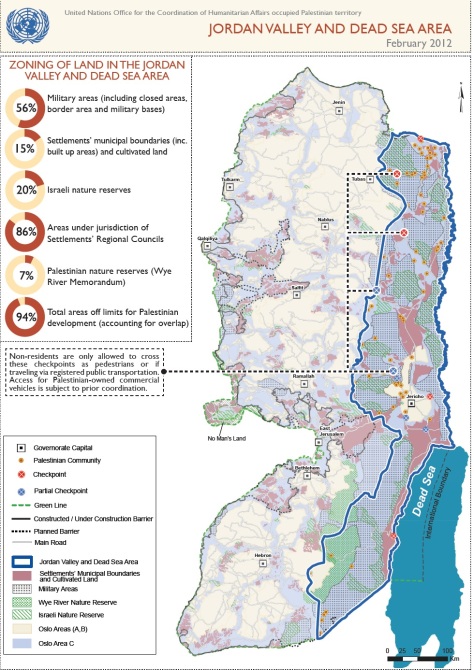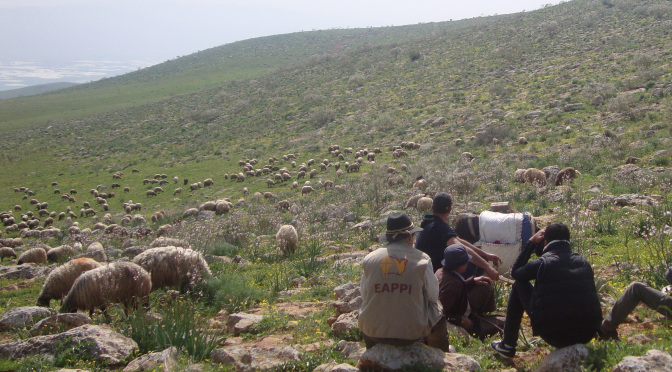“They are so happy”, tells me our driver.” Why?” I ask back. “Because the settlers did nothing when they saw you”.
Dear Readers, I must confess, my thoughts were mixed in that moment. It went well, I thought, but what if the settlers had started to hit? We would not been able to protect the shepherds. EA’s do not intervene, we are there, protect with our sheer presence, and observe, but we do not engage. From a human point of view, it is not always easy to deal in certain situations with this rule, but this rule has made possible to protect many people for many years. Protective presence does work, as the following story will show you. The settlers did not attack, because we were there. May we have a happy end in the holy land?
The small dialogue between our team’s driver and at the same time our translator, and my following thoughts, took place while we were doing protective presence during shepherding. During these “spring months”, when the Jordan Valley blossoms and becomes green, around the months of January until beginning of April, the herding communities need to go grazing their sheep. Otherwise, the sheep will not have enough to eat. No sheep means having nothing to eat, to sell, in other words nothing to survive and consequently having to leave the village. Many of these herding communities used to be much bigger. In Al Haddidiya, in the Northern Jordan Valley, around 300 families used to live there in 1967. 30 years later only 50 families remained, and now just 14 families, or in another words around 100 people, live in Al Haddidya. The others left for cities like Jericho or Tubas, where surviving is possible, and life more comfortable. In the Jordan Valley, we observe mainly three reasons why it gets virtually impossible or very difficult for shepherds to graze their sheep: heavy settler harassment, military training and areas declared military/firing zone or nature reserve, sometimes both together. This leaves them with little to no space for grazing.
Being on the field we can observe how the area between Tell el Himma and Khirbet Samra, not even 15km distance from each other, is centre of ongoing and increasing harassment towards the herding communities by settlers. Surrounded or even in parts in firing zone, many communities of the Jordan Valley like Khirbet Samra or Tell el Himma have to deal with problems around military activities, like noises all night long, unexploded ordnance, or even training between the houses, or rather tents, of the villagers. Sometimes, these firing zones aren’t used for military purpose – no training or the like is done there. And it puzzles me as many others, how it can be that military zones are at the same time nature reserves. Worse, if you look at the map in Jordan Valley everywhere is firing zone – beside of settlements, some agricultural area, Jericho and its few surrounding communities.
 Map Jordan Valley – Most space in the Jordan Valley is used by the settlements or by the military forces. Little space remains for the communities, most of them living from their livestock.
Map Jordan Valley – Most space in the Jordan Valley is used by the settlements or by the military forces. Little space remains for the communities, most of them living from their livestock.  PhotoEAPPI_AGarcia
PhotoEAPPI_AGarcia
The other problem for the herding communities is harassment from different sides. In the area around Khirbet Samra and Tell el Himma two new Outposts, usually the beginning of a settlement, regarded by Israeli law as illegal, were installed. The settlers in the outpost are harassing the shepherds during, or also after, the grazing on daily basis. We heard e.g. the story of Ibrahim, who went one day out with the sheep and encountered several settlers. They took him and started threatening him, telling him not to come back, while throwing stones at the sheep, killing one and hurting another one. The same community experienced before and after regular “visits” by the settlers. Armed, they come to their simple tents and tell them not to go shepherding again. Similar story in other communities. Threats but also just “casual” visits, in which they just stand around the communities watching on their horses or from their cars.
The harassment doesn’t only come from the settlers. We heard a couple of weeks ago the story of a young shepherd, who was coming back from grazing the sheep. Just when he was about to enter the village near the main road, two soldiers got out of their jeep and started kicking him in the face, head, and stomach without previous warning. Only when they saw people from the village approaching did they drive away.
 Khirbet Samra seen from a hilltop. In the Jordan Valley you see many herding communities like this.
Khirbet Samra seen from a hilltop. In the Jordan Valley you see many herding communities like this.  PhotoEAPPI_AGarcia
PhotoEAPPI_AGarcia
The shepherds are scared. So scared, that they don’t go shepherding without protective presence from Israeli organisations or internationals. Therefore, the other day, we accompanied the shepherds. We were climbing a hill, when someone yelled that settlers were coming. Quicker we went, trying to evade any confrontation, looking out for the hilltop. My EA-colleague is first up, when I’m there three settlers have gotten out of their car, and one tells to my colleague “Yeah take your pictures!”. My colleague just smiles and ignores the provocation. I tell the others “let’s move on”, so not to give the settlers any excuses for further provocation. But I also realize, they are surprised. Surprised of seeing us, seeing internationals there. And that changes the whole dynamic of events, they just stand there and wait for what is going to happen. When we walk on the dogs of the settlers and the shepherds start to fight each other. In that moment, I actually started to get nervous. What if the dogs hurt the settlers, or hurt their dogs? That might be an excuse for settlers to call the IDF or the police. I tell the others again, to walk on, and that the dogs will follow, as they always follow their masters. So the dogs did. We walk on, and around an hour and a half later, we rest for the lunch break. As usual, the shepherds share with us their meal – no “la” (“no” in Arabic) from our side accepted. Today we have a delicious pan of potatoes and vegetables, instead of the usual salted boiled cheese and za’atar. We sit down and eat. Our driver tells me, how happy they are. Moments later a shepherd yells a lamb is born. We go admire the little lamb. First, his mother doesn’t want anything to do with it, but the shepherds know all the tricks. At the end, she angrily pushes any sheep coming too near to her baby. My other colleague tells me “oh I hope this is really a happy ending”. We look at each other and bitterly remark how we cling to these little happy endings, the lamb loved by the mother, the settlers not attacking. We cling on them, because we lack bigger happy endings. Maybe one day, there is a happy end for all people living in the holy land. Inshallah.
 A little lamb is born during shepherding, a common sight this time of the year.
A little lamb is born during shepherding, a common sight this time of the year.  PhotoEAPPI_AGarcia
PhotoEAPPI_AGarcia
EAPPI 2017, Jordan Valley
Image à la Une: EA accompanies shepherds during the grazing. ©PhotoEAPPI_AGarcia
http://www.ochaopt.org/documents/ocha_opt_jordan_valley_factsheet_february_2012_english.pdf


Nice. I know how sometimes you help but I know some of you who dismiss after a moment because it was so hard just to look at when violence is going stronger and stronger.
Inch’Allah…go ahead and congratulations.
J’aimeJ’aime